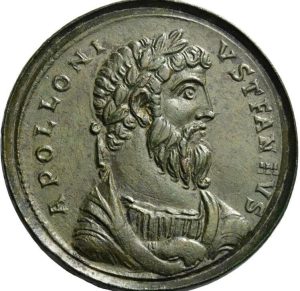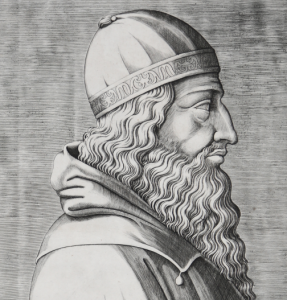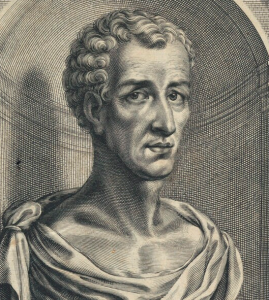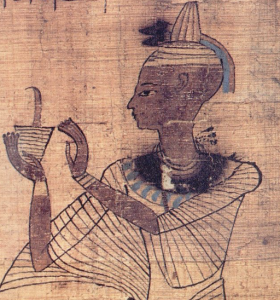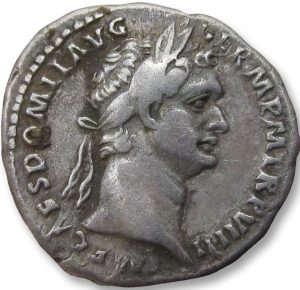The “Pagan Jesus” from Anatolia to India, Greece to Ethiopia, Rome to Cadiz
On-line Course in Ancient Greek, 3rd June – 27 July, 2023.
For some, Apollonius of Tyana is a renowned thaumaturgist and the last pagan prophet. For others, he is considered one of the most intriguing examples of a charlatan and fabulist from antiquity. He was born in a ancient Cappadocian town at the feet of the Taurus mountains, then at sixteen he gave up his family wealth to dedicate himself to poverty and wisdom. From here, he traveled the world surrounded by a following of disciples and admirers which grew from port to port and crossroads to crossroads. He journeyed with them from Anatolia to the Valley of the Indus, from the Persian Gulf to the shallows of Corinth, from the Palatine to the western seas, from the temples of Memphis to the sands of Ethiopia and then onward to the deserts and the forests where the Cataracts of the Nile roll onward with their deafening roar. These travels narrated by Philostratus have undergone countless adaptations over the centuries, revealing at times an interest in adventure, at other times an interest in the obscure and esoteric, and other times still an interest in wild historical reconstructions. One such example would be the story in which Apollonius, having reached the land of the Slavs is reported to have buried an amulet on the site where Kraków Fortress would later stand, endowing the future Polish city with an inexhaustible source of cosmic energy.
The aim of this course is to examine the “divine Apollonius” and his wanderings in all their ambiguity. As someone often compared to Jesus of Nazareth, this too will feature in the course; both from the perspective of those who see in Apollonius a sad and disturbing parody of Christ and from the perspective of those who view him as the last hero of paganism who resisted a triumphant Christianity.
Part 1: Life of Apollonius
The first component of the course comprises a reading of Philostratus’ Life of Apollonius complemented by various ancient and medieval sources that recount stories about his life. We will read about Apollonius crossing the Hindu Kush and casting of a shade of the night, we will also see him converse with brahmins, as well as with learned men in Egypt and Ethiopia. We will also explore the accounts of Apollonius discerning the presence of a demon concealed beneath the rags of a beggar as well as his performance of miracles throughout Anatolia. Some of these include the curing of plagues and resurrection of the dead. To conclude, we will read of his trial brought about through the delatores of Domitian and his mysterious death.
This part of the course will take place in seminar format via zoom (webinar) every Saturday from 17:00 to 18:15 CET.
Each seminar will be conducted entirely in Ancient Greek (Attic).
Each session will be recorded and made available up through the end of the course.
Part 2: Writing and Conversation in Ancient Greek
Every Thursday at 18:00, Schola Humanistica will offer a series of Zoom sessions organized around on the themes of the readings with a focus on the practice of conversational and written ancient Greek. These sessions may be attended independently of the reading sessions.
In this component of the course we will explore vocabulary and syntax pertaining to magic, religion, land and sea travel, the geography of Asia and Africa, the brahmins, and the Roman Empire.
Each of these sessions will be designed to provide participants with an opportunity to converse with one another and engage with them face to face on the Zoom platform.
Each of these special exercises will likewise be recorded and made available for the duration of the course.
Last day to Register: 2nd June
Enrollment in both parts or only one part of the course is possible (see the columns below for more information).
Program schedule
Enrollment in both parts or only one part of the course is possible (see the columns below for more information).
PART 1:
The Story of Orestes Narrated in Ancient Greek (Zoom Webinar)
| Schedule | Topic |
| I. Saturday, 3nd June, h. 17:00-18:15 CET |
Prophets and pseudoprophets
|
| II. Saturday, 10th June, h. 17:00-18:15 CET |
To the Indus Valley
|
| III. Saturday, 17th June, h. 17:00-18:15 CET |
Brahmins and Levitation
|
| IV. Saturday, 24th June, h. 17:00-18:15 CET |
The Beggar of Ephesus
|
| V. Saturday, 1st July, 17:00-18:15 CET |
The Seas of the West
|
| VI. Saturday, 8th July h. 17:00-18:15 CEST |
The Desert and the Land of the “Naked Ones”
|
| VII. Saturday, 15th July, h. 17:00-18:15 CEST |
Magic
|
| VIII Saturday, 22nd July, h. 17:00-18:15 CEST |
In Rome: the trial of Apollonius
|
PART 2
Writing and Conversation in Ancient Greek
| Schedule | Topic |
| I. Thurdsay, 8th June, h. 18:00-19:15 CET |
Priests, prophets, and charlatans
|
| II. Thurdsay, 15th June, h. 18:00-19:15 CET |
Asia
|
| III. Thurdsay 22nd June, h. 18:00-19:15 CET |
India
|
| IV. Thurdsay 29th June, h. 18:00-19:15 CET |
Shallows in Antiquity
|
| V. Thurdsay, 6th July, h. 18:00-19:15 CEST |
The Sea
|
| VI. Thurdsay, 13th July, h. 18:00-19:15 CEST |
Africa
|
| VII. Thurdsay, 20th July, h. 18:00-19:15 CEST |
Demons in daylight
|
| VIII. Thursday, 27th July, h. 18:00-19:15 CEST |
Rome
|
